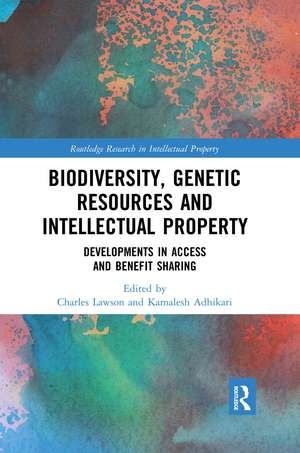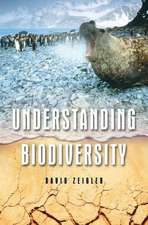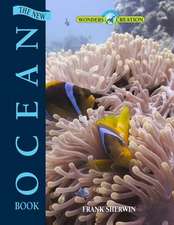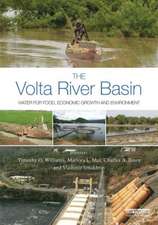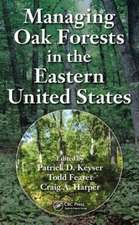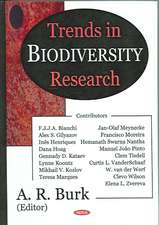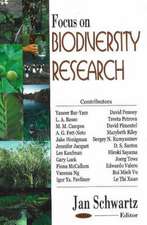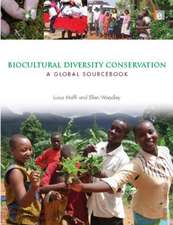Biodiversity, Genetic Resources and Intellectual Property: Developments in Access and Benefit Sharing: Routledge Research in Intellectual Property
Editat de Kamalesh Adhikari, Charles Lawsonen Limba Engleză Paperback – 14 aug 2020
Biodiversity, Genetic Resources and Intellectual Property: Developments in Access and Benefit Sharing of Genetic Resources addresses current issues arising from recent developments in the enduring and topical debates about managing genetic resources through the ABS regime. The book explores key historical, doctrinal, and theoretical issues in the field, at the same time developing new ideas and perspectives around ABS. It shows the latest state of knowledge and will be of interest to researchers, academics, policymakers, and students in the fields of intellectual property, governance, biodiversity and conservation, sustainable development, and agriculture.
| Toate formatele și edițiile | Preț | Express |
|---|---|---|
| Paperback (1) | 389.66 lei 43-57 zile | |
| Taylor & Francis – 14 aug 2020 | 389.66 lei 43-57 zile | |
| Hardback (1) | 765.01 lei 43-57 zile | |
| Taylor & Francis – 19 mar 2018 | 765.01 lei 43-57 zile |
Din seria Routledge Research in Intellectual Property
-
 Preț: 295.43 lei
Preț: 295.43 lei -
 Preț: 311.41 lei
Preț: 311.41 lei -
 Preț: 325.72 lei
Preț: 325.72 lei -
 Preț: 340.83 lei
Preț: 340.83 lei -
 Preț: 311.76 lei
Preț: 311.76 lei - 26%
 Preț: 652.04 lei
Preț: 652.04 lei -
 Preț: 443.65 lei
Preț: 443.65 lei - 18%
 Preț: 1109.18 lei
Preț: 1109.18 lei -
 Preț: 350.72 lei
Preț: 350.72 lei -
 Preț: 469.34 lei
Preț: 469.34 lei - 19%
 Preț: 136.01 lei
Preț: 136.01 lei - 18%
 Preț: 1059.45 lei
Preț: 1059.45 lei - 18%
 Preț: 1109.18 lei
Preț: 1109.18 lei - 18%
 Preț: 1002.36 lei
Preț: 1002.36 lei -
 Preț: 416.22 lei
Preț: 416.22 lei -
 Preț: 389.66 lei
Preț: 389.66 lei - 18%
 Preț: 1003.12 lei
Preț: 1003.12 lei -
 Preț: 449.41 lei
Preț: 449.41 lei -
 Preț: 317.73 lei
Preț: 317.73 lei - 20%
 Preț: 931.42 lei
Preț: 931.42 lei -
 Preț: 369.73 lei
Preț: 369.73 lei -
 Preț: 489.26 lei
Preț: 489.26 lei -
 Preț: 374.54 lei
Preț: 374.54 lei -
 Preț: 280.71 lei
Preț: 280.71 lei - 25%
 Preț: 654.07 lei
Preț: 654.07 lei -
 Preț: 492.74 lei
Preț: 492.74 lei - 26%
 Preț: 763.61 lei
Preț: 763.61 lei - 18%
 Preț: 708.67 lei
Preț: 708.67 lei -
 Preț: 461.66 lei
Preț: 461.66 lei - 18%
 Preț: 999.51 lei
Preț: 999.51 lei - 18%
 Preț: 1060.43 lei
Preț: 1060.43 lei -
 Preț: 379.77 lei
Preț: 379.77 lei - 18%
 Preț: 1067.84 lei
Preț: 1067.84 lei - 23%
 Preț: 320.36 lei
Preț: 320.36 lei
Preț: 389.66 lei
Nou
Puncte Express: 584
Preț estimativ în valută:
74.56€ • 78.05$ • 62.06£
74.56€ • 78.05$ • 62.06£
Carte tipărită la comandă
Livrare economică 31 martie-14 aprilie
Preluare comenzi: 021 569.72.76
Specificații
ISBN-13: 9780367592172
ISBN-10: 0367592177
Pagini: 280
Dimensiuni: 152 x 229 x 18 mm
Greutate: 0.41 kg
Ediția:1
Editura: Taylor & Francis
Colecția Routledge
Seria Routledge Research in Intellectual Property
Locul publicării:Oxford, United Kingdom
ISBN-10: 0367592177
Pagini: 280
Dimensiuni: 152 x 229 x 18 mm
Greutate: 0.41 kg
Ediția:1
Editura: Taylor & Francis
Colecția Routledge
Seria Routledge Research in Intellectual Property
Locul publicării:Oxford, United Kingdom
Public țintă
PostgraduateCuprins
Chapter 1: Biodiversity, Genetic Resources and Intellectual Property
Charles Lawson and Kamalesh Adhikari
Chapter 2: Reconceptualising Access: Moving Beyond the Limits of International Biodiversity Laws
Kamalesh Adhikari
Chapter 3: Aligning Means and Ends to Benefit Indigenous Peoples under the Convention on Biological Diversity and the Nagoya Protocol
Edwin Bikundo
Chapter 4: Banking on a Patent Solution for Sharing Antarctica’s Ex Situ Genetic Resources
Fran Humphries
Chapter 5: Nomenclature as a Standardized Metadata System for Ordering and Accessing Information about Plants
Charles Lawson
Chapter 6: Free Prior Informed Consent - Mere Politics or Meaningful Change?
Paul Martin
Chapter 7: The Trans-Pacific Partnership and Sustainable Development: Access to Genetic Resources, Informed Consent, and Benefit Sharing
Matthew Rimmer
Chapter 8: The Limits of ABS Laws: Why Gumby Gumby and other Bush Foods and Medicines need specific Indigenous Knowledge Protections
Daniel Robinson, Margaret Raven and John Hunter
Chapter 9: Reshaping the International Access to Genetic Resources and Benefit Sharing Process? Overcoming Resistance to Change and Correction
Manuel Ruiz Muller
Chapter 10: Certified ABS: The Union for Ethical BioTrade and the use of trade and certification marks to encourage and facilitate behaviour change
Jay Sanderson, Leanne Wiseman and Drossos Stamboulakis
Charles Lawson and Kamalesh Adhikari
Chapter 2: Reconceptualising Access: Moving Beyond the Limits of International Biodiversity Laws
Kamalesh Adhikari
Chapter 3: Aligning Means and Ends to Benefit Indigenous Peoples under the Convention on Biological Diversity and the Nagoya Protocol
Edwin Bikundo
Chapter 4: Banking on a Patent Solution for Sharing Antarctica’s Ex Situ Genetic Resources
Fran Humphries
Chapter 5: Nomenclature as a Standardized Metadata System for Ordering and Accessing Information about Plants
Charles Lawson
Chapter 6: Free Prior Informed Consent - Mere Politics or Meaningful Change?
Paul Martin
Chapter 7: The Trans-Pacific Partnership and Sustainable Development: Access to Genetic Resources, Informed Consent, and Benefit Sharing
Matthew Rimmer
Chapter 8: The Limits of ABS Laws: Why Gumby Gumby and other Bush Foods and Medicines need specific Indigenous Knowledge Protections
Daniel Robinson, Margaret Raven and John Hunter
Chapter 9: Reshaping the International Access to Genetic Resources and Benefit Sharing Process? Overcoming Resistance to Change and Correction
Manuel Ruiz Muller
Chapter 10: Certified ABS: The Union for Ethical BioTrade and the use of trade and certification marks to encourage and facilitate behaviour change
Jay Sanderson, Leanne Wiseman and Drossos Stamboulakis
Notă biografică
Charles Lawson is a Professor at the Australian Centre for Intellectual Property in Agriculture, Griffith Law School, Griffith University, Australia.
Kamalesh Adhikari is AIBE Research Fellow in Food Security and Member of the ARC Laureate Project ‘Harnessing Intellectual Property to Build Food Security’, TC Beirne School of Law, The University of Queensland, Australia.
Kamalesh Adhikari is AIBE Research Fellow in Food Security and Member of the ARC Laureate Project ‘Harnessing Intellectual Property to Build Food Security’, TC Beirne School of Law, The University of Queensland, Australia.
Descriere
Developments in Access and Benefit Sharing of Genetic Resources addresses current issues arising from recent developments in the enduring and topical debates about managing genetic resources through the ABS regime. The book explores key historical, doctrinal, and theoretical issues in the field, at the same time developing new idea
